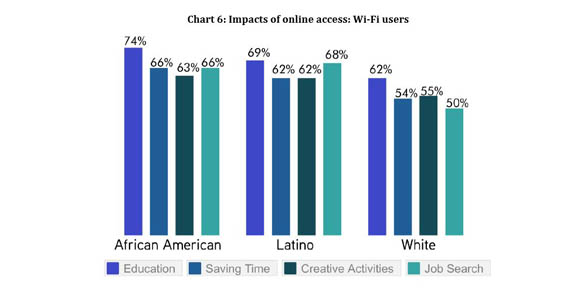
Public, free Wi-Fi access has exploded in recent years – essentially all public libraries now offer it – but only now are we beginning to get a fuller picture of how essential these services are to many communities.
ALA’s District Dispatch recently reported on a survey conducted by WifiForward about Americans’ usage of and attitudes toward public Wi-Fi networks. A majority of Americans have used a public access Wi-Fi network, often in a public library, and also feel that Wi-Fi networks have a positive impact on themselves and the community.
For African American and Latino populations, public Wi-Fi is particularly important, and one third of each of these communities has used the Internet via a public library Wi-Fi network. African Americans and Latinos who do use Wi-Fi also experience more positive impacts of the Internet. Among these communities, well over half indicate that access to the Internet helps them with education, saving time, job searches, and creative activities.
The fact that essentially all public libraries now offer Wi-Fi is clearly a victory, yet there are still many ways in which libraries and other public Wi-Fi providers can improve service and ensure the security of users. In fact, a large majority of all community groups surveyed (86% of whites, 85% of African Americans, and 84% of Latinos) think providers should focus more on the security of users’ information.
So far, this survey is one of the most thorough looks at how access to Wi-Fi networks influences the attitudes and behavior of different communities. You can delve into the full report here.
Note: This post is part of our series, “The Weekly Number.” In this series, we highlight statistics that help tell the story of the 21st-century library.